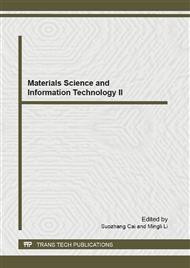[1]
J. Kennedy, and R.C. Eberhart. Particle swarm optimization. Proceedings of IEEE International Conference on Neural Networks. Piscataway, NJ: IEEE Press Center (1995): 1942-(1948).
Google Scholar
[2]
Clerc, and J. Kennedy. The particle swarm: explosion, stability, and convergence in a multi-dimensional complex space. IEEE Transactions on Evolutionary Computation, 1(2002): 58-73.
DOI: 10.1109/4235.985692
Google Scholar
[3]
X. Hu, R.C. Eberhart, and Y. H. Shi. Engineering optimization with particle swarm. Proceedings of the IEEE Swarm Intelligence Symposium, Indianapolis, Indiana, USA (2003) : 53-57.
DOI: 10.1109/sis.2003.1202247
Google Scholar
[4]
Y.H. Shi, and R.C. Eberhart. Empirical study of particle swarm optimization. Proceedings of the IEEE Congress on Evolutionary Computation, Piscataway, NJ: IEEE Press Center (1999): 1945~(1950).
Google Scholar
[5]
Y. H. Shi, and R.C. Eberhart. A modified particle swarm optimizer. In: Proceedings of the IEEE Congress on Evolutionary Computation, Piscataway, NJ: IEEE Press Center (1998): 69-73.
DOI: 10.1109/icec.1998.699146
Google Scholar
[6]
Angeline, P. Using selection to improve particle swarm optimization. Proceedings of IJCNN'99, Washington USA (1999): 84-89.
Google Scholar
[7]
Eberhart,R. C., and Kennedy, J. A new optimizer using particles swarm theory. Proc. Sixth International Symposium on Micro Machine and Human Science (Nagoya, Japan), IEEE Service Center, Piscataway (1995): 39-43.
DOI: 10.1109/mhs.1995.494215
Google Scholar
[8]
Kaiyou Lei, Yuhui Qiu and Yi He. A new adaptive well-chosen inertia weight strategy to automatically harmonize global and local search ability in particle swarm optimization. 1st International Symposium on Systems and Control in Aerospace and Astronautics, Harbin, China (2006).
DOI: 10.1109/isscaa.2006.1627487
Google Scholar
[9]
Chen Bing-rui, Feng Xia-ting. Particle swarm optimization with contracted ranges of both search space and velocity. Journal of Northeastern University (Natural Science), 5(2005): 488-491.
Google Scholar
[10]
Wang Jun-wei, Wang Ding-wei. Experiments and analysis on inertia weight in particle swarm optimization. Journal of Systems Engineering, 2(2005): 184-198.
Google Scholar
[11]
Zhong Wei-cai, Xue Ming-zhi, et al. Multi-agent genetic algorithm for super-high dimension complex functions optimization. Natural Science Progress, 10(2003): 1078-1083.
Google Scholar
[12]
Li Bing-yu, Xiao Yun-shi and Wang Lei. A hybrid particle swarm optimization algorithm for solving complex functions with high dimensions. Information and Control, 1(2004): 27-30.
Google Scholar


